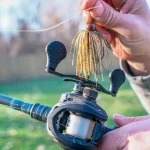Besides being a thrill to catch, the bass is highly-sought sport fish. We are discussing here the most confusing topic can you eat bass? If you are permitted to take it home under local regulations, you can eat these. The majority of bass you can catch after a little research. You should investigate the quality of the water and fish locally before your trip.
Can You Eat Bass Fish?
The sport of bass fishing is popular with many anglers. They should release the bass fish than eat them. Bass is a favorite fish for many people, but you can also eat these fish.
Bass is a protein that should only be consumed by people familiar with the area that they caught them, the local regulations, and the species. In Maine, for instance, the Center for Disease Control and Prevention advises that one should not eat striped bass since it contains PCBs.
Almost all kinds of bass fish contain trace amounts of mercury. So experts recommend that adults shouldn’t consume more than six fillets in one month to allow the body to process out the excess mercury.
Furthermore, fish provides a high concentration of omega-3 fatty acids that are unavailable in other foods. According to Harvard’s School of Public Health, eating these foods can lower cholesterol and blood pressure and decrease heart disease risk.
Polychlorinated biphenyls, or PCBs, are now widespread in our nation’s waterways. There are warnings in many states concerning the levels in fish populations. But some researchers suggest keeping the consumption of fish consumption also building lean muscle.
Bass anglers are sometimes afraid of harming the bass population in their favorite lakes by keeping their bass. But fish populations are carefully managed based on local regulations. So, as long as you don’t exceed the daily bag limit or size restrictions, you can keep and fry up the fish you catch.
Can Pregnant Women Eat Bass?
Pregnant women should avoid overeating bass due to the potential for mercury poisoning. As recommended by the American Pregnancy Association, women should limit their consumption of black bass to six 6-ounce servings per month, with the support of the Federal Drug Administration. In addition, you should reduce the amount of bass that you eat if you eat other kinds of fish.
LIMITING MERCURY INTAKE
While pregnant, limit yourself to 18 ounces of Chilean sea bass per month since it contains more mercury than other varieties. In the course of eating smaller fish that have been exposed to mercury, larger fish absorb it. When eating fish, it’s generally a good idea to eat the most significant fish possible.
LISTERIA CONCERNS WITH FISH PREPARATION
The fear of listeria during pregnancy is also common. There is a high chance that it will become listeriosis, a type of food poisoning if pregnant women do not follow all advised food preparation instructions. If a bout of food poisoning is not dangerous to your health, listeria can still cause long-term harm to your fetus.
Due to the number of dietary restrictions placed on pregnant women, eating a varied diet is essential. If you are pregnant, you should eat fish at least once a week. Make sure you and your child are safe by limiting yourself and still get some essential vitamins and minerals that only fish can offer.
The proper storage of bass filets is key to preventing bacteria from contaminating the fish. Once the fish has been frozen, wrap it in plastic wrap, aluminum foil, or wax paper and set it on an ice bed. It’s best to use crushed ice since it allows the greatest amount of contact. However, your local gas station or tackle shop may have simply a bag of ice.
Fishing for largemouth bass
Generally speaking, largemouth bass is more active early in the day or later in the evening since the sun and warm water make them less active during those times. It is rather common for them to congregate in mossy areas where there is a plentiful supply of food such as fish like minnows.
During cooler weather and when the sun isn’t as strong, this fish will be very active. In addition to baitcasting and bottom casting, fly-fishing is another common strategy for fishing largemouth bass.
Final Thoughts
We have answered the most confusing question can you eat bass. The only disadvantage is that it contains high levels of mercury. The consumption of bass is safe for adults, but not for children or pregnant women unless medically advised. Nonetheless, they should limit the quantity of meat they consume. Therefore, the smallmouth bass is best for consumption because of their young age and low mercury level in the body.
Additional Resources:






